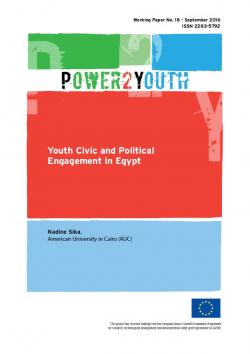Youth Civic and Political Engagement in Egypt
This paper investigates the extent to which young people are included or excluded in the social, economic, cultural and political spheres in Egypt. Based on fieldwork conducted among young people between March-December 2015, the paper analyses why some young people choose street contention and mobilization, and why others have chosen to become involved in mainstream politics, economy and society. The fieldwork has shown that urban, young, educated middle- and upper-class young people are most included in the social and cultural spheres. However, a major determinant of this inclusion is for these young people to accept the regime’s authority and not be in the political opposition.
-
Details
Roma, IAI, September 2016, 27 p. -
Issue
18
Introduction
1. The Structural Context Prior to January 2011
2. The Post-January 25 Structural Context
How Does the Regime Frame Young People?
Framing Young People after January 2011: Old Wine in New Bottles?
Policies Constraining Activism: An Attempt to Control Cyberspace
Activism and Protestation
3. Factors of Exclusion
Exclusion within the Private and the Social Realms
Socio-economic Background of Young People: A Determinant of Inclusion
4. Political Participation and Active Exclusion
Human Rights Organizations and Protest Movements
Student Unions and Political Parties
5. Organizational Aspects of Exclusion/Inclusion
6. Beyond Exclusion: How Do Young People Perceive Their Role in Society?
Identifying Youths’ Self-perception
What Is Change for Young People?
Challenges Faced by Organized Youth
January 25: A Short-lived Political Opportunity
Overcoming Obstacles: Young People’s Perception of Bringing Youth Back In
7. Public Domains
Migration
Employment
Housing
Conclusion
References
Related content
-
Ricerca08/10/2014
POWER2YOUTH - Freedom, dignity and justice
leggi tutto



